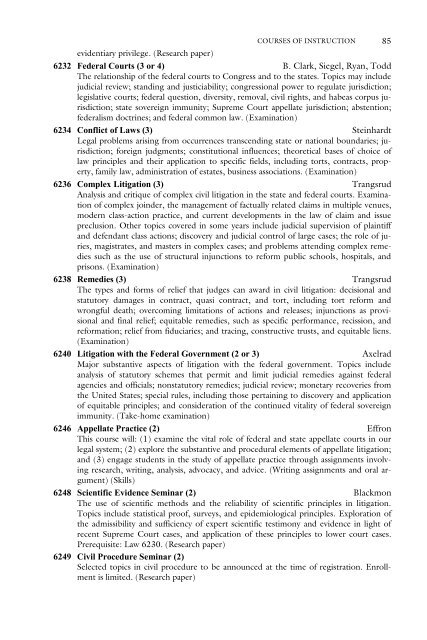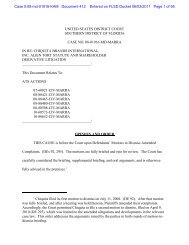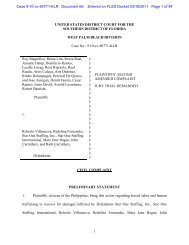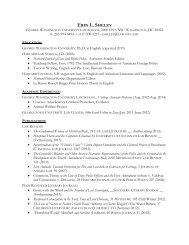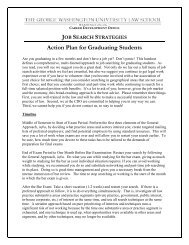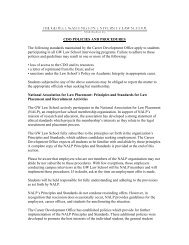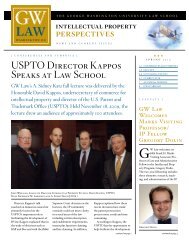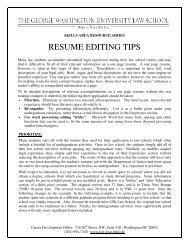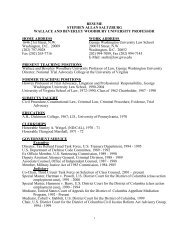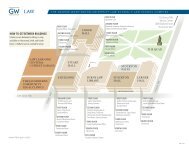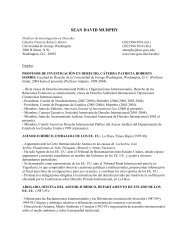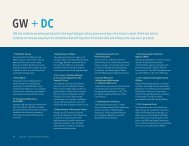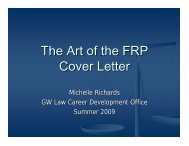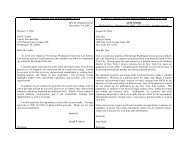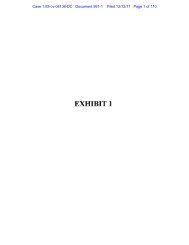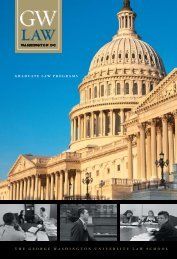The Bulletin - George Washington University Law School
The Bulletin - George Washington University Law School
The Bulletin - George Washington University Law School
- No tags were found...
You also want an ePaper? Increase the reach of your titles
YUMPU automatically turns print PDFs into web optimized ePapers that Google loves.
COURSES OF INSTRUCTION 85evidentiary privilege. (Research paper)6232 Federal Courts (3 or 4) B. Clark, Siegel, Ryan, Todd<strong>The</strong> relationship of the federal courts to Congress and to the states. Topics may includejudicial review; standing and justiciability; congressional power to regulate jurisdiction;legislative courts; federal question, diversity, removal, civil rights, and habeas corpus jurisdiction;state sovereign immunity; Supreme Court appellate jurisdiction; abstention;federalism doctrines; and federal common law. (Examination)6234 Conflict of <strong>Law</strong>s (3) SteinhardtLegal problems arising from occurrences transcending state or national boundaries; jurisdiction;foreign judgments; constitutional influences; theoretical bases of choice oflaw principles and their application to specific fields, including torts, contracts, property,family law, administration of estates, business associations. (Examination)6236 Complex Litigation (3) TrangsrudAnalysis and critique of complex civil litigation in the state and federal courts. Examinationof complex joinder, the management of factually related claims in multiple venues,modern class-action practice, and current developments in the law of claim and issuepreclusion. Other topics covered in some years include judicial supervision of plaintiffand defendant class actions; discovery and judicial control of large cases; the role of juries,magistrates, and masters in complex cases; and problems attending complex remediessuch as the use of structural injunctions to reform public schools, hospitals, andprisons. (Examination)6238 Remedies (3) Trangsrud<strong>The</strong> types and forms of relief that judges can award in civil litigation: decisional andstatutory damages in contract, quasi contract, and tort, including tort reform andwrongful death; overcoming limitations of actions and releases; injunctions as provisionaland final relief; equitable remedies, such as specific performance, recission, andreformation; relief from fiduciaries; and tracing, constructive trusts, and equitable liens.(Examination)6240 Litigation with the Federal Government (2 or 3) AxelradMajor substantive aspects of litigation with the federal government. Topics includeanalysis of statutory schemes that permit and limit judicial remedies against federalagencies and officials; nonstatutory remedies; judicial review; monetary recoveries fromthe United States; special rules, including those pertaining to discovery and applicationof equitable principles; and consideration of the continued vitality of federal sovereignimmunity. (Take-home examination)6246 Appellate Practice (2) EffronThis course will: (1) examine the vital role of federal and state appellate courts in ourlegal system; (2) explore the substantive and procedural elements of appellate litigation;and (3) engage students in the study of appellate practice through assignments involvingresearch, writing, analysis, advocacy, and advice. (Writing assignments and oral argument)(Skills)6248 Scientific Evidence Seminar (2) Blackmon<strong>The</strong> use of scientific methods and the reliability of scientific principles in litigation.Topics include statistical proof, surveys, and epidemiological principles. Exploration ofthe admissibility and sufficiency of expert scientific testimony and evidence in light ofrecent Supreme Court cases, and application of these principles to lower court cases.Prerequisite: <strong>Law</strong> 6230. (Research paper)6249 Civil Procedure Seminar (2)Selected topics in civil procedure to be announced at the time of registration. Enrollmentis limited. (Research paper)


